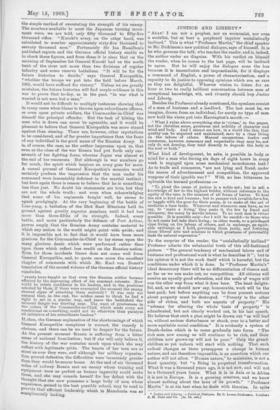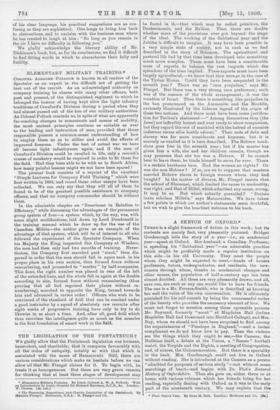JUSTICE AND LIBERTY.* " Aras! I am not a prophet,
nor an economist, nor even a socialist, but at best a perplexed inquirer socialistically inclined." This is what "Professor Martin," the chief speaker in Mr. Dickinson's new political dialogue, says of himself. It is he who governs the talk, who teaches the reader, and is, indeed, the author under no disguise. With his verdict on himself the reader, when he comes to the last page, will be 'inclined to agree. But he will enjoy the dialogue none the less
because it is inconclusive and impracticable, for it displays a command of English, a power of characterisation, and as capacity to do justice to opposing opinions which are as rare as they are delightful. Whoever wishes to listen for an hour or two to really brilliant conversation between men of exceptional knowledge, wit, and vivacity should buy Justice and Liberty.
Besides the Professor already mentioned, the speakers consist of a man of business and a landlord. The last must be, we imagine, drawn from an individual, for surely no type of men now hold the views put into Harrington's mouth :--
"What I value above everything else is 'virtue,' in the pagan, not the &dation sense, greatness and nobility of character and mind and body. And I cannot see how, in a world like this, that quality can be acquired and maintained, save by a class living on the labour of others. Manual occupations, trades and commerce, however necessary and respectable they may be, not only do not develop, they tend directly to degrade the body or the soul or both."
What kind of development, he asks, is possible in body or mind for a man who during six days of eight hours in every week is engaged upon some mechanical monotonous task P As to trade and commerce, "are not lying and fraud, under the names of advertisement and competition, the approved weapons of their ignoble war ? " With no less bitterness he upbraids the learned professions
" To plead the cause of justice is a noble act ; but to sell a knowledge of law to the highest bidder, without reference to the equity of the case, is the meanest of all forms of barter. To heal the sick is kind and humane ; but to pamper rich invalids fora fee, or haggle with the poor for their pence, is to make of the art of medicine a base trade. Wherever and whenever men have, as wo say, to ' make a living,' they make it, the few by fraud and chicanery, the many by servile labour. To no such men is virtue possible. It is possible only—for I will bo candid—to those who do not make but take their living ; in other words, to a privileged class living on the labour of others, and in exchange, an equit- able exchange, as I hold, governing them justly, and fostering those liberal arts and sciences in which greatness of personality finds its natural expression."
To the surprise of the reader, the "socialistically inclined" Professor admits the substantial truth of this old-fashioned picture. " The general tendency of mechanical labour and of business and professional work is what he describes it " ; but in his opinion it is not the work itself which is harmful, but the conditions under which it is done. In "Professor Martin's" ideal democracy there will be no differentiation of classes and, so far as we can make out, no competition. All citizens will receive an equally good education, and the scale of wages will run the other way from what it does here. The least delight- ful, and, as we should now say, honourable, work will be the best paid; but before anything can be done present notions about property must be destroyed. " Poverty is the other side of riches, and both are aspects of property." His "scheme for altering the whole basis of property" is adumbrated, but not clearly worked out, in his last speech. He believes that such a plan might be drawn out "as will lead us, without serious disturbance or shock, over to a better and more equitable social condition." It is evidently a system of Death-duties which is to come gradually into force. " The rich men now among us will continue to be rich, and their children now grown-up will not be poor." Only the grand- children as yet unborn will start with nothing. That such radical changes as these presuppose a change in human nature, and are therefore impossible, is an assertion which our author will not allow. "Human nature," he maintains, is not a fixed quantity, but "a Being in perpetual transformation. What it was a thousand years ago, it is not now, and will not be a thousand years hence. What it is in Asia or in Africa it is not in Europe. It is a growing creature, and we know almost nothing about the laws of its growth." " Professor Martin" is at his best when he deals with theories. In spite • Justice and Liberty : a Political M.:slops. Ely G. Lows Dickinson. London s J. X. Dont and Co. ESA 05, not.)
of his clear language, his practical suggestions are as con- fusing as they are sophistical. One longs to bring him back to abstractions, and to exclaim with the business man whom he has created to laugh at him : " So long as you remain in the air I have no difficulty in following you."
We gladly acknowledge the literary ability of Mr. Dickinson's book, but, as for its conclusions, we find it difficult to find fitting words in which to characterise their folly and futility.











































 Previous page
Previous page